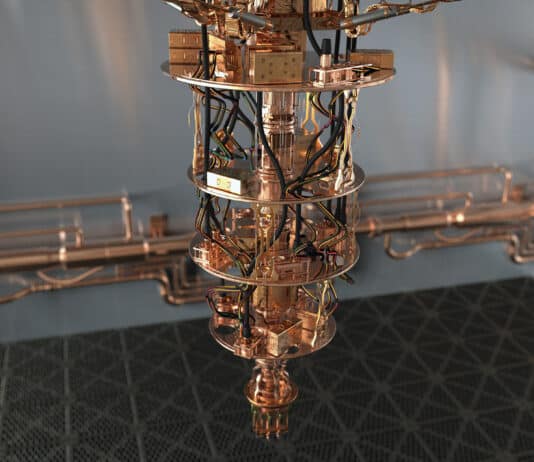Tag: QUANTUM
While CRQCs capable of breaking current public key encryption algorithms have not yet materialized, technological advancements are pushing us towards what is ominously dubbed 'Q-Day'—the day a CRQC becomes operational. Many experts believe that Q-Day, or Y2Q as it's sometimes called, is just around the corner, suggesting it could occur by 2030 or even sooner; some speculate it may already exist within secret government laboratories.
Fidelity in quantum computing measures the accuracy of quantum operations, including how effectively a quantum computer can perform calculations without errors. In quantum systems, noise and decoherence can degrade the coherence of quantum states, leading to errors and reduced computational accuracy. Errors are not just common; they're expected. Quantum states are delicate, easily disturbed by external factors like temperature fluctuations, electromagnetic fields, and even stray cosmic rays.
"Harvest Now, Decrypt Later" (HNDL), also known as "Store Now, Decrypt Later" (SNDL), is a concerning risk where adversaries collect encrypted data with the intent to decrypt it once quantum computing becomes capable of breaking current encryption methods. This is the quantum computing's ticking time bomb, with potential implications for every encrypted byte of data currently considered secure.
The transition to post-quantum cryptography is a complex, multi-faceted process that requires careful planning, significant investment, and a proactive, adaptable approach. By addressing these challenges head-on and preparing for the dynamic cryptographic landscape of the future, organizations can achieve crypto-agility and secure their digital assets against the emerging quantum threat.
In my work with various clients, I frequently encounter a significant misunderstanding about the scope of preparations required to become quantum ready. Many assume that the transition to a post-quantum world will be straightforward, involving only minor patches to a few systems or simple upgrades to hardware security modules (HSMs). Unfortunately, this is a dangerous misconception. Preparing for this seismic shift is far more complex than most realize.
As we edge closer to the Q-Day—the anticipated moment when quantum computers will be capable of breaking traditional cryptographic systems—the need for crypto-agility becomes increasingly critical. Crypto-agility is the capability of an organization to swiftly and efficiently transition between different cryptographic algorithms and protocols in response to emerging threats and technological advancements.
As quantum technologies garner global attention, its economic and national security implications are positioning these set of technologies alongside AI and 5G as pivotal emerging technologies for the future. Governments worldwide are recognizing the strategic importance of quantum technologies, which broadly includes quantum computing, quantum communication and quantum sensing.
The journey towards quantum resistance is not merely about staying ahead of a theoretical threat but about evolving our cybersecurity practices in line with technological advancements. Starting preparations now ensures that organizations are not caught off guard when the landscape shifts. It’s about being informed, vigilant, and proactive—qualities essential to navigating any future technological shifts.
As the quantum era approaches, organizations face the daunting task of protecting their sensitive data from the looming threat of quantum computers. These powerful machines have the potential to render traditional cryptographic methods obsolete, making it imperative to explore innovative strategies for quantum readiness. One often overlooked yet highly promising approach is tokenization.
Adiabatic Quantum Computing (AQC), and its variant Quantum Annealing, are another model for quantum computation. It's a specialized subset of quantum computing focused on solving optimization problems by finding the minimum (or maximum) of a given function over a set of possible solutions. For problems that can be presented as optimization problems, such as 3-SAT problem, quantum database search problem, and yes, the factoring problem we are worried about, quantum annealers have shown great potential in solving them in a way that classical computers struggle with.
Since the early 2000s, the field of quantum computing has seen significant advancements, both in technological development and in commercialization efforts. The experimental demonstration of Shor's algorithm in 2001 proved to be one of the key catalyzing events, spurring increased interest and investment from both the public and private sectors.
Quantum Key Distribution (QKD) represents a radical advancement in secure communication, utilizing principles from quantum mechanics to distribute cryptographic keys with guaranteed security.Unlike classical encryption, whose security often relies on the computational difficulty of certain mathematical problems, QKD's security is based on the laws of physics, which are, as far as we know, unbreakable.
The secret sauce of quantum computing, which even Einstein called "spooky," is the ability to generate and manipulate quantum bits of data or qubits. Certain computational tasks can be executed exponentially faster on a quantum processor using qubits, than on a classical computer with 1s and 0s. A qubit can attain a third state of superimposition of 1s and 0s simultaneously, encode data into quantum mechanical properties by "entangling" pairs of qubits, manipulate that data and perform huge complex calculations very quickly.
Quantum computing holds the potential to revolutionize fields where classical computers struggle, particularly in areas involving complex quantum systems, large-scale optimization, and cryptography. The power of quantum computing lies in its ability to leverage the principles of quantum mechanics—superposition and entanglement—to perform certain types of calculations much more efficiently than classical computers.
Cryptographic systems rely on the unpredictability and randomness of numbers to secure data. In cryptography, the strength of encryption keys depends on their unpredictability. Unpredictable and truly random numbers—those that remain secure even against extensive computational resources and are completely unknown to adversaries—are among the most essential elements in cryptography and cybersecurity.
















